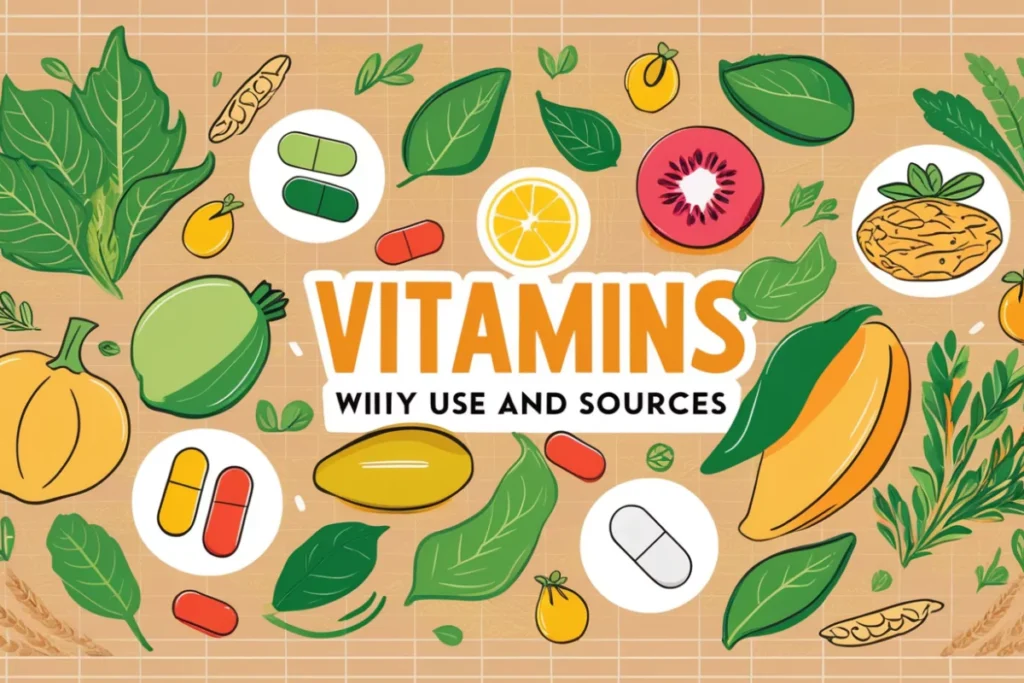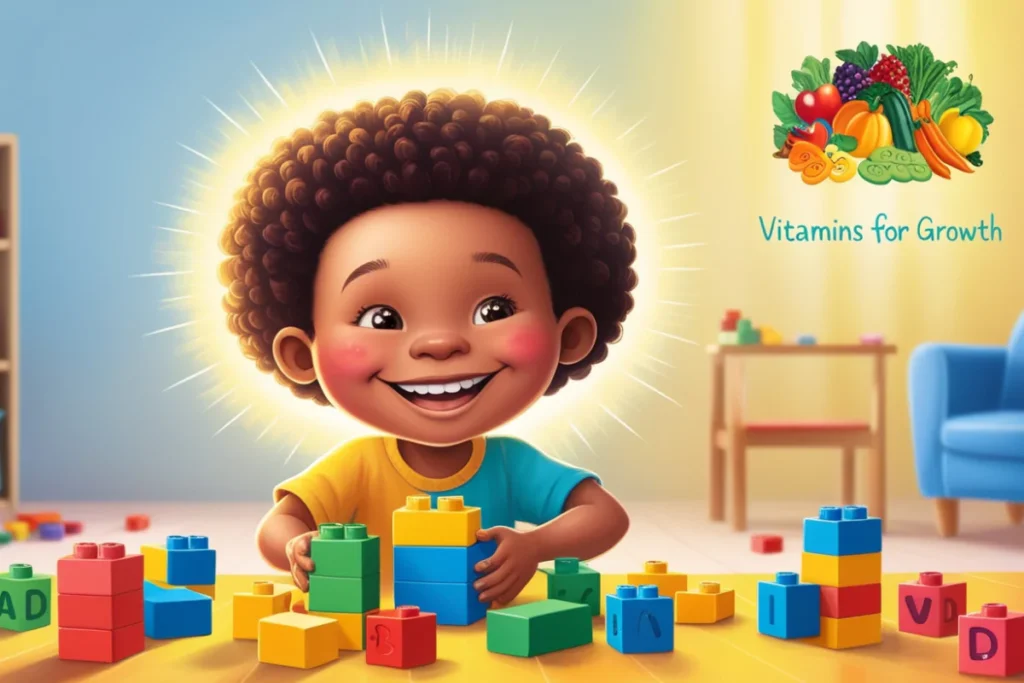Hello Beautiful people, Are you worried like me that your child isn’t getting all the nutrients? It’s no trouble at all, I’ll be sharing my experience because I’ve faced the same issue due to lack of vitamins.
Basically, children’s vitamins fill the slots in your child’s selection of food. They also help them grow strong. These tiny nutrients contain all required ingredients for your child’s growth and well-being.
Welcome to the world of vitamins, where we’ll discuss seven captivating reasons why these essential nutrients are necessary for your child. Each vitamin plays a special role in nurturing your child’s health. We’ll discover the secrets of vitamins and their impact on your child’s journey.
Let’s get started!
Table of Contents
Uses And Sources Of Vitamins

Vitamins | Information and Uses | Food Sources | Supplement Use |
Vitamin A | Supports vision, immune function, and skin health | Carrots, sweet potatoes, spinach, kale | Recommended for deficiency or specific needs |
Vitamin B |
|
|
|
Vitamin C |
|
|
|
Vitamin D |
|
|
|
Vitamin E |
|
|
|
Vitamin K |
|
|
|
Supplements |
|
|
|
Why Vitamins Are Needed for Development of Kids?

When we see our child having playing in the playground or if he’s learning something new, it gives us happiness. This is because these moments show us that our child is growing and learning.
You know what helps them grow? Vitamins play a huge role in their growth. Following are 7 reasons why vitamins are important for your child’s growth:
Strong Immunity
Vitamins C and D help to make up strong immunity i.e. will help your child fight against sickness. They keep your child healthy and strong. In this way, your child will keep playing and growing day by day.
Strong Bones
Vitamins D and calcium make your child’s bones and teeth strong.
Smart Brain
B vitamins help the brain function properly. This vitamin helps with learning and remembering different stuff.
Energy Boosters
They also help as energy boosters, they boost and make energy so your child can play all day.
Clear Eyesight
Vitamin A helps your child in clear vision.
Happy Belly:
Vitamins keep the stomach of your child healthy. If your child’s stomach is good, overall health of child will be good.
Filling in the Slots
Vitamins help in filling the slots. For example, when your child’s diet doesn’t contain everything they need for growth and advancement, vitamins fill these cracks.
The following video is related to vitamin deficiency in children:
Healthy Diet with Vitamins
Consider this thing that vitamins are good, but eating healthy food is very important too. Here are some reasons why:
1. Different Vitamins
Healthy food has many good nutrients, it helps your body work well and stay healthy like it contains:
- Vitamins
- Minerals
- Fiber
- Antioxidants.
2. Better Absorption
Our body uses the nutrients from food better than from pills. Good food is natural and better source of nutrients. The body knows how to use the nutrients from food because they’re natural.
3. Special Nutrients
Some foods have special nutrients that you can’t get from vitamins alone called phytonutrients. They help keep your child’s body healthy.
4. Vitamins Help in Digestion
Foods have fiber that helps your stomach work well and keeps you feeling full and happy. Some foods include:
- Fruits
- Veggies
- Whole grains.
5. Healthy Weight
Eating healthy food can help you keep up good weight. It helps you know when you’re filled up, so you don’t eat excessive.
6. Vitamins Taste Good
Eating different foods from around the world is entertainment and tasty! It’s good to try new things, take a look at blessings of God and enjoy your snack.
Choosing the Right Vitamins for Your Child
The most important decision you can take is choosing the right vitamins for your child. This will impact your child’s growth and development. Here are some considerations that will help you make a good choice while choosing vitamins for your children:
1. Consult Your Child’s Doctor for Vitamins
This is the fundamental step before starting any vitamin additive i.e. talk to your child’s doctor. He’ll evaluate your child and recommend the most convenient vitamins considering your child’s:
- Nutritional needs
- Health status
- Any other specific concerns.
2. Identify Your Child’s Needs
If your child has some specific nutritional needs or deficiencies, identify them and take vitamins accordingly.
For example, some children may need extra iron, vitamin D, or omega-3 fatty acids. A blood test or health assessment can help determine these needs.
3. Choose Quality Vitamins
You should look for reputable brands that prefer quality standards and have undergone testing for safety. Check for certifications like:
- NSF International
- USP Verified
- ConsumerLab.
4. Check Dosage and Form of Vitamins
Ensure appropriate dosage of vitamins according to your child’s age and weight. Choose easy form for your child to take, such as:
- Chewable tablets
- Gummies
- Liquid drops.
5. Consider Allergies and Sensitivities
Check if your child has sensitivities, check the ingredients list for common allergens like:
- Gluten
- Dairy
- Soy
- Nuts
- Artificial flavors.
6. Avoid Excessive-Supplementation
When it comes to vitamins, more isn’t always superior. You need to keep your child away from giving them more than recommended doses of vitamins, as this can usher to health risks. Just cane to the recommended dosage otherwise, these vitamins can harm your child’s health.
7. Combine with Healthy Diet
Remember that supplements can’t replace a healthy diet. They are meant to complement healthy food. Keep encouraging your child to eat a variety of nutrient-rich foods like:
- Fruits
- Vegetables
- Whole grains
- Lean proteins
- Dairy products.
8. Monitor Effects of Vitamins
The last but not the least is to keep track of any changes or improvements after starting vitamin supplement on following things:
- Child’s health
- Energy levels
- Mood
- Overall well-being
By following these guidelines, you can choose the right vitamins that will support your child’s health and well-being effectively.
Conclusion
In conclusion, vitamins are tiny packages that strongly support health. They make sure that your child gets the nutrients they need for a healthy life. Remember, a balanced diet is essential. If you add essential nutrients into your child’s routine, you’re helping them reach their full potential. Embrace their and you’ll see your child flourish!
They are helpful addition for your child’s growth. So, talk to your child’s doctor and choose the right ones. You’ll see how these vitamins will boost your child’s well-being. They will make your child a strong and healthy champion!
Let me know are you providing your children with vitamins they require?
FAQ
1. If my child eats a healthy diet should I give him vitamins?
Children’s vitamins can help to fill nutritional gaps. They are especially for picky eaters. So, if your child’s diet include all sufficient vitamins, minerals etc you can skip them.
2. What are side effects of children’s vitamins?
If you give your child as directed, they have minimal side effects. However, some children may experience:
- Digestive issues
- Constipation
- Upset stomach
- Allergies to certain ingredients
3. Can I use grown man vitamins for my child?
No, it’s not recommended to give children adult vitamins. Adult vitamins contain strong quantity of nutrients that can be harmful for your children. Always give your children the specifically designed for them.
4. Can vitamins replace a healthy diet for my 12 years old son?
They should be taken with a balanced diet. I’ll recommend not try to replace them. Encourage your child to eat variety of foods so they can receive all the essential nutrients.
5. When is the effective time to give vitamins to my child?
They are recommended with meals. Meals help in absorption. Always follow the recommended dosage instructions on the product label or as guided by your child’s healthcare provider.




